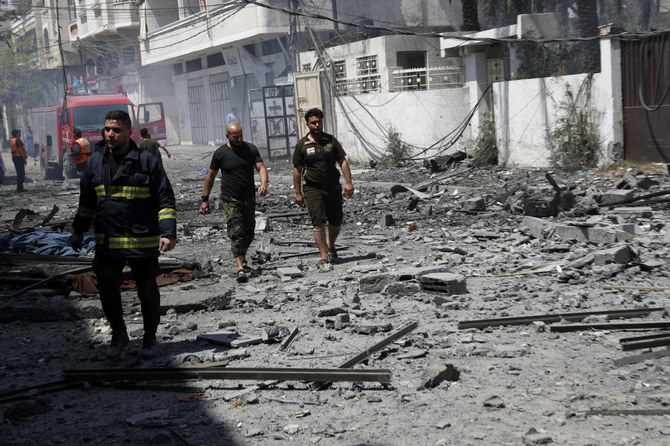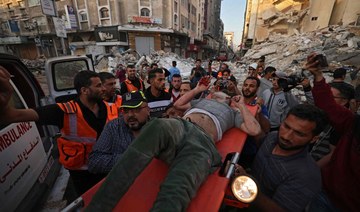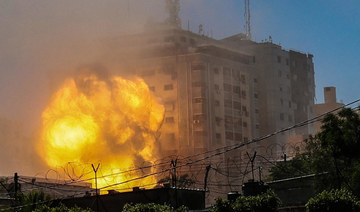GAZA CITY, Gaza Strip: Israeli airstrikes on Gaza City flattened three buildings and killed at least 42 people Sunday, Palestinian medics said. Despite the heavy death toll and international efforts to broker a cease-fire, Israeli Prime Minister Benjamin Netanyahu signaled the fourth war with Gaza’s Hamas rulers would rage on.
In a televised address, Netanyahu said Sunday evening the attacks were continuing at “full-force” and will “take time.“ Israel “wants to levy a heavy price” from the Hamas militant group, he said, flanked by his defense minister and political rival, Benny Gantz, in a show of unity.
The Israeli air assault early Sunday was the deadliest single attack since heavy fighting broke out between Israel and Hamas nearly a week ago, marking the worst fighting here since their devastating 2014 war in Gaza.
The airstrikes hit a major downtown street of residential buildings and storefronts over the course of five minutes after midnight, destroying two adjacent buildings and one about 50 yards (meters) down the road.
At one point, a rescuer shouted, “Can you hear me?” into a hole in the rubble. “Are you OK?” Minutes later, first responders pulled a survivor out and carried him off on an orange stretcher. The Gaza Health Ministry said 16 women and 10 children were among those killed, with more than 50 people wounded, and rescue efforts are still underway.
Earlier, the Israeli military said it destroyed the home of Gaza’s top Hamas leader, Yahiyeh Sinwar, in a separate strike in the southern town of Khan Younis. It was the third such attack in the last two days on the homes of senior Hamas leaders, who have gone underground.
Opinion
This section contains relevant reference points, placed in (Opinion field)
Israel appears to have stepped up strikes in recent days to inflict as much damage as possible on Hamas as international mediators work to end the fighting and stave off an Israeli ground invasion in Gaza. But targeting the group’s leaders could hinder those efforts. A US diplomat is in the region to try to de-escalate tensions, and the UN Security Council is meeting Sunday.
In its airstrikes, Israel has leveled a number of Gaza City’s tallest office and residential buildings, alleging they contain Hamas military infrastructure. Among them was the building housing The Associated Press office and those of other media outlets.
The latest outbreak of violence began in east Jerusalem last month, when Palestinian protests and clashes with police broke out in response to Israeli police tactics during Ramadan and the threatened eviction of dozens of Palestinian families by Jewish settlers. A focal point of clashes was the Al-Aqsa Mosque, a frequent flashpoint that is located on a hilltop compound that is revered by both Muslims and Jews.
Hamas fired rockets toward Jerusalem late Monday, triggering the Israeli assault on impoverished Gaza, which is home to more than 2 million Palestinians and has been under an Israeli and Egyptian blockade since Hamas seized power from rival Palestinian forces in 2007.
At least 188 Palestinians have been killed in Gaza, including 55 children and 33 women, with 1,230 people wounded. Eight people in Israel have been killed, including a 5-year-old boy and a soldier.
Speaking alongside Netanyahu on Sunday, Israel’s military chief, Lt. Gen. Aviv Kohavi, said Hamas did not anticipate Israel’s overwhelming response to its rocket fire. “Hamas made a serious and grave mistake and didn’t read us properly.”
The turmoil has also spilled over elsewhere, fueling protests in the occupied West Bank and stoking violence within Israel between its Jewish and Arab citizens, with clashes and vigilante attacks on people and property.
On Sunday, a driver rammed into an Israeli checkpoint in the east Jerusalem neighborhood of Sheikh Jarrah — where the Palestinian families had been threatened with eviction — injuring six officers before police shot and killed the attacker, Israeli police said.
The violence also sparked pro-Palestinian protests in cities across Europe and the United States, with French police firing tear gas and water cannons at demonstrators in Paris.
The military said Sunday it struck Sinwar’s home and that of his brother Muhammad, another senior Hamas member. On Saturday it destroyed the home of Khalil al-Hayeh, a senior figure in Hamas’ political branch.
Hamas’ upper echelon has gone into hiding in Gaza, and it is unlikely any were at home at the time of the strikes. Hamas’ top leader, Ismail Haniyeh, divides his time between Turkey and Qatar, both of which provide political support to the group.
Hamas and the Islamic Jihad militant group have acknowledged 20 fighters killed since the fighting broke out Monday. Israel says the real number is far higher and has released the names and photos of two dozen alleged operatives it says were “eliminated.”
An Egyptian diplomat said Israel’s targeting of Hamas political leaders would complicate cease-fire efforts. The diplomat, who spoke on condition of anonymity to discuss the closed-door negotiations, said Cairo is working to broker an end to the fighting, as are other international actors.
The Egyptian diplomat said the destruction of Hamas’ rocket capabilities would require a ground invasion that would “inflame the whole region.” Egypt, which made peace with Israel decades ago, has threatened to “suspend” cooperation in various fields, the official said, without elaborating.
Meanwhile, the Biden administration has affirmed its support for Israel while working to de-escalate the crisis. American diplomat Hady Amr met with Gantz, the Israeli defense minister, who thanked the US for its support. Gantz said Israel “takes every precaution to strike at military targets only and avoid harming civilians, while its civilians are the targets of indiscriminate attack.”
Hamas and other militant groups have fired some 2,900 rockets into Israel. The military said 450 of the rockets had fallen short or misfired, while Israeli air defenses intercepted 1,150.
The interception rate appeared to have significantly dropped since the start of the conflict, when Israel said 90% were intercepted. The military did not immediately respond to a request for comment.
Israel has meanwhile carried out hundreds of airstrikes across Gaza.
On Saturday, Israel bombed the 12-story al-Jalaa Building, which housed the offices of The Associated Press, the TV network Al-Jazeera and other media outlets, along with several floors of apartments.
Netanyahu alleged that Hamas military intelligence was operating inside the building. Such reasoning is routinely given for targeting certain locations in airstrikes, including residential buildings. The military also has accused the militant group of using journalists as human shields, but provided no evidence to back up the claims.
The AP has operated from the building for 15 years, including through three previous wars between Israel and Hamas. During those conflicts as well as the current one, the news agency’s cameras, operating from its top floor office and roof terrace, offered 24-hour live shots as militants’ rockets arched toward Israel and Israeli airstrikes hammered the city and its surroundings.
“We have had no indication Hamas was in the building or active in the building,” AP President and CEO Gary Pruitt said in a statement. “This is something we actively check to the best of our ability. We would never knowingly put our journalists at risk.”
In the afternoon, the military called the building’s owner and warned a strike would come within an hour. AP staffers and other occupants evacuated safely. Soon after, three missiles hit the building and destroyed it, bringing it crashing down in a giant cloud of dust.
“The world will know less about what is happening in Gaza because of what happened today,” Pruitt said. “We are shocked and horrified.”




























